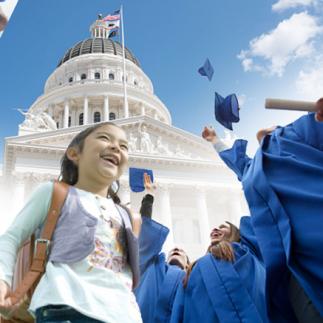Californians and Public Education

Summary
With important state and national elections looming, where do California voters stand on some of the major education policy issues of the day? This report examines findings from the 2020 PACE/USC Rossier Poll of California voters. The poll represents the views of 2,000 registered California voters across a range of topics from early childhood education to higher education. Based on these results, we have identified five key findings:
Finding 1
There is growing pessimism about the direction of California and its public schools.
Voters gave California schools the lowest grade in at least half a decade, with a commensurate decline in the proportion of voters indicating that California schools were improving. Parents’ views dipped especially sharply. More generally, voters expressed growing disapproval of Governor Gavin Newsom and State Superintendent of Public Instruction Tony Thurmond.
Finding 2
Voters have strong concerns about both gun violence in schools and the affordability of higher education and prioritize K–12 and higher education over early childhood.
We asked several questions about voters’ priorities, and education rated highly (just after the economy and taxes). As in prior surveys, voters’ top education policy issues were gun violence in schools and college affordability, and they rated K–12 and higher education issues as more important than early childhood education issues.
Finding 3
Voters express negative opinions about higher education, especially the fairness of private college admissions.
We found that voters have serious concerns about the fairness of private college admissions, and they are evenly split on the fairness of admissions at California public universities. Voters oppose admissions preferences for several groups that featured prominently in recent high-profile scandals (athletes, children of university alumni, and children of donors).
Finding 4
Voters support an increase in educational spending and multiple approaches to paying for that spending.
California voters consistently express support for increased educational spending (including, for example, for teacher salaries and early childhood education). They are strongly in favor of the proposed $15 billion facilities bond measure that will be on the March 2020 ballot, and they also support proposed changes to Proposition 13 that are likely to appear on the November 2020 ballot (though to a lesser degree). There are sharp partisan splits on support for spending increases.
Finding 5
Voters are concerned about teacher shortages and are strongly in favor of increasing teacher salaries.
When asked about the relative importance of 12 education issues, California voters placed teacher shortages third. Large majorities of California voters, regardless of party affiliation or demographics, support increasing teacher salaries.
Full poll results can be found in the Poll Archive.
Polikoff, M., Hough, H. J., Marsh, J., & Plank, D. (2020, February). Californians and public education: Views from the 2020 PACE/USC Rossier poll [Report]. Policy Analysis for California Education. https://edpolicyinca.org/publications/pace-and-usc-rossier-polls-2020



